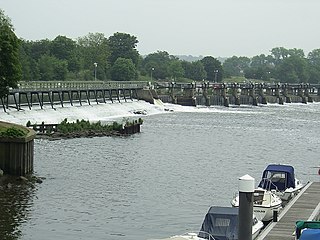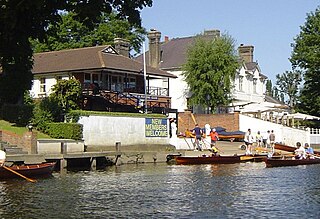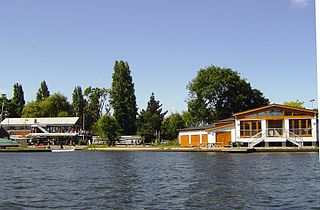Related Research Articles

The River Thames, known alternatively in parts as the River Isis, is a river that flows through southern England including London. At 215 miles (346 km), it is the longest river entirely in England and the second-longest in the United Kingdom, after the River Severn.

Lechlade is a town at the edge of the Cotswolds in Gloucestershire, England, 55 miles (89 km) south of Birmingham and 68 miles (109 km) west of London. It is the highest point at which the River Thames is navigable, although there is a right of navigation that continues south-west into Cricklade, in the neighbouring county of Wiltshire. The town is named after the River Leach that joins the Thames near the Trout Inn and St. John's Bridge.

Teddington Lock is a complex of three locks and a weir on the River Thames between Ham and Teddington in the London Borough of Richmond upon Thames, England. Historically in Middlesex, it was first built in 1810.

A punt is a flat-bottomed boat with a square-cut bow, designed for use in small rivers and shallow water. Punting is boating in a punt; the punter propels the punt by pushing against the river bed with a pole. Punts were originally built as cargo boats and as platforms for fowling and for fishing, such as angling; whereas now punting is boating for pleasure.

The Thames Path is a National Trail following the River Thames from one of its sources near Kemble in Gloucestershire to the Woolwich foot tunnel, south east London. It is about 185 miles (298 km) long. A path was first proposed in 1948 but it only opened in 1996.

The Tideway is the part of the River Thames in England which is subject to tides. This stretch of water is downstream from Teddington Lock. The Tideway comprises the upper Thames Estuary including the Pool of London.

Iffley Lock is a lock on the River Thames in England near the village of Iffley, Oxfordshire. It is on the southern outskirts of Oxford. The original lock was built by the Oxford-Burcot Commission in 1631 and the Thames Navigation Commission replaced this in 1793. The lock has a set of rollers to allow punts and rowing boats to be moved between the water levels.
A Thames skiff is a traditional River Thames wooden rowing boat used for skiffing. These boats evolved from Thames wherries in the Victorian era to meet a passion for river exploration and leisure outings on the water.

Skiffing refers to the sporting and leisure activity of rowing a Thames skiff. The skiff is a traditional hand built clinker-built wooden craft of a design which has been seen on the River Thames and other waterways in England and other countries since the 19th century. Sculling is the act of propelling the boat with a pair of oars, as opposed to rowing which requires both hands on a single oar.

Hammerton's Ferry is a pedestrian and cycle ferry service across the River Thames in the London Borough of Richmond upon Thames, London, England. The ferry links the river's northern bank near Marble Hill House in Twickenham with its southern bank near Ham House in Ham. It is one of only four remaining ferry routes in London not to be replaced by a bridge or tunnel.

Teddington Lifeboat Station is a lifeboat station in Teddington, in west London, on the River Thames. It is one of the Royal National Lifeboat Institution (RNLI)'s newest lifeboat stations and is also one of the first to cover a river rather than estuarial waters or the sea. Teddington Lock is the highest tidal point on the Thames.
The Thames is one of the main rowing rivers in Europe. Several annual competitions are held along its course, including the Henley Royal Regatta, The Boat Race and other long-distance events, called Head of the River races (Heads).
The Skiff Club is the oldest skiff and punting club in existence, having been founded in 1895. It is based on the River Thames in London, on the Middlesex bank between Teddington Lock and Kingston upon Thames.

Thames Valley Skiff Club is an English skiff and punting club, which was founded in 1923. It is based on the River Thames in England, on the Surrey bank between Sunbury Lock and Walton on Thames.

Wraysbury Skiff and Punting Club (WSPC) is an English skiff and punting club founded in 1931 based on the River Thames at the start of the Surrey section of the right bank – between the rest of Runnymede and Bell Weir Lock.
The Thames Punting Club (TPC) is the governing body in England for the sport of punt racing.

The Skiff Championships Regatta is the premier skiff racing regatta on the River Thames in England. It is held annually at Henley on the Sunday of August Bank Holiday weekend.

Dittons Skiff and Punting Club (DSPC or Dittons) is an English skiff and punting club, which was founded in 1923. It is based on the River Thames with a club and boat house at Thames Ditton on the reach above Teddington Lock. As well as taking part in regular skiff and punt racing competitions, crews from the club have established several rowing world records.

Hampton Court and Dittons Regatta is a regatta on the River Thames in England which takes place at Thames Ditton, Surrey beside Hampton Court Palace.

Walbrook Rowing Club, colloquially sometimes named Teddington Rowing Club, is a rowing club, on the River Thames in England on the Middlesex bank 800 metres above Teddington Lock next to Trowlock Island, Teddington. It is the lowest club on the weir-controlled Thames and is the organising club for Teddington Head of the River Race held in November for all classes of racing shells.
References
- ↑ "Dittons Skiff and Punting Club - Record - Single Giant Meander". www.dittons.org.uk. Archived from the original on 7 October 2007. Retrieved 12 January 2022.
- ↑ "Home". thamesmeander.com.